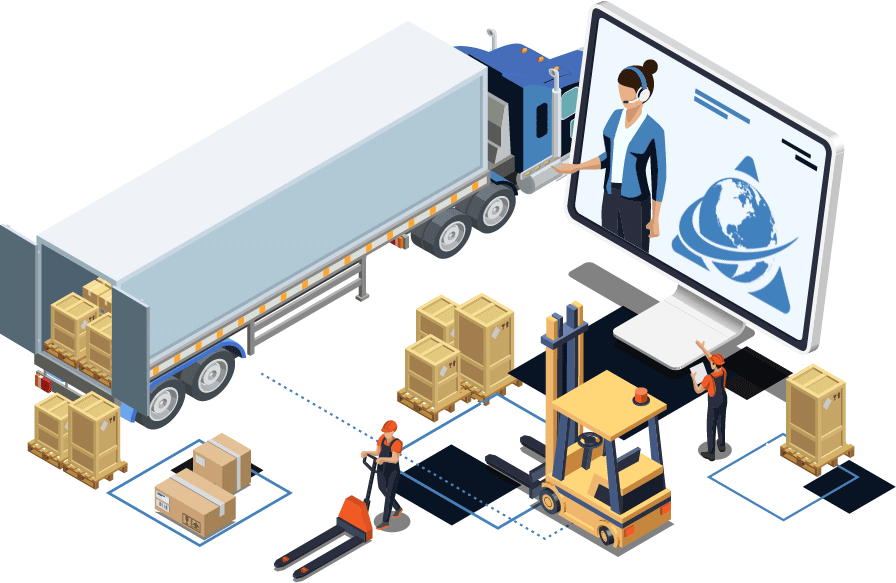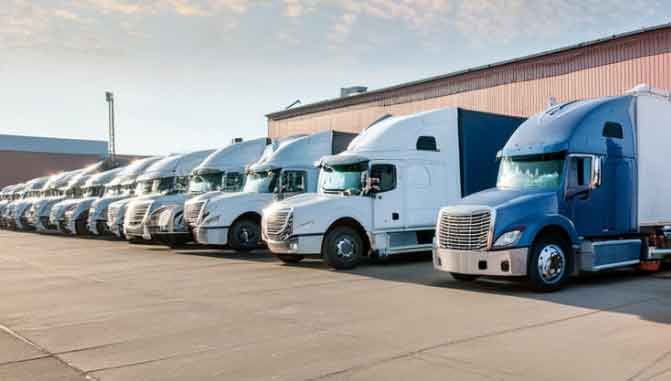Benefits of ERP Integration with a Transportation Management System (TMS)
Advantages of ERP Integration with a Transportation Management System
Shippers face numerous challenges in managing their supply chains efficiently. To stay competitive and meet customer demands, investing in robust technological supply chain solutions is essential. One such powerful combination is integrating an Enterprise Resource Planning (ERP) system with a Transportation Management System (TMS). This article explores the remarkable benefits shippers can enjoy by embracing this integration.
What is an ERP System?
An ERP (Enterprise Resource Planning) system is a comprehensive software solution that integrates various business functions and processes within an organization. It allows companies to manage and automate core activities, such as supply chain management, finance, human resources, procurement, inventory management, production planning, and customer relationship management (CRM). ERP systems provide a centralized and unified platform for data management, facilitating efficient resource allocation, data analysis, and decision-making across different departments and functions.
What is a TMS System?
A Transportation Management System (TMS) is a software solution designed to streamline and optimize transportation and logistics operations. It provides functionalities such as load planning, carrier selection, route optimization, shipment tracking, and freight payment. TMS systems help shippers manage their transportation processes efficiently, improve visibility, and enhance overall supply chain performance.
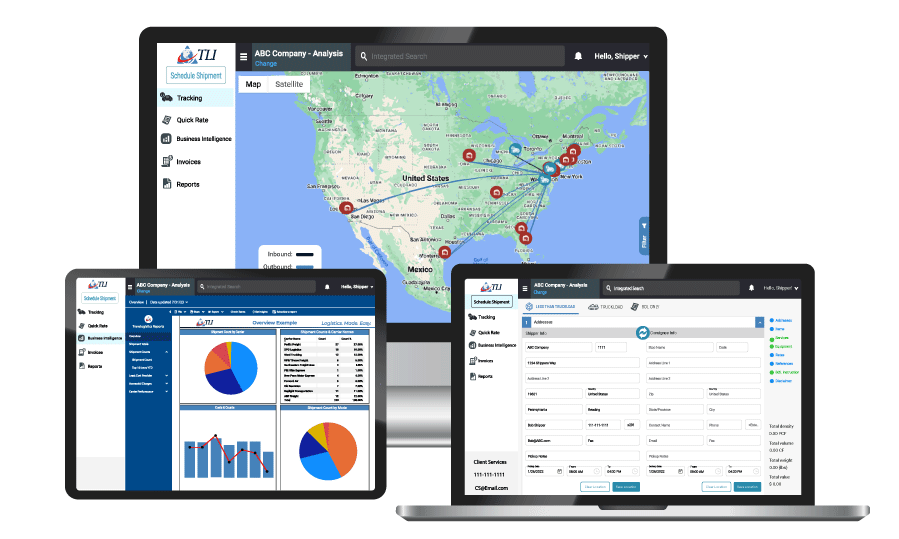
Is integrating an ERP and TMS system expensive?
The cost of integrating an ERP and TMS system can vary depending on several factors, including the complexity & customization of the systems being integrated, the scope of integration, the specific requirements of the organization, and the chosen software vendors. For most of TLI's customers the cost to integrate is very modest, and a worthwhile investment.
Integrating ERP and TMS systems typically involves upfront costs related to software licenses, implementation, configuration, and customization. There may also be ongoing maintenance and support expenses based upon customized reporting request. Additionally, integration may require IT resources and expertise to ensure a smooth and successful implementation.
It's worth noting that there are different integration options available, ranging from pre-built connectors to custom-built interfaces, and the complexity and cost can vary accordingly. Organizations should carefully evaluate their needs, consider the potential benefits, and work closely with software vendors or integration specialists to determine the most cost-effective solution for their specific requirements.
While integration costs can be significant, it's important to consider the long-term benefits and potential cost savings that can be achieved through streamlined operations, improved efficiency, and enhanced decision-making. A thorough cost-benefit analysis should be conducted to assess the return on investment (ROI) and determine the financial feasibility of integrating an ERP and TMS system for a particular organization.
A simple ROI (Return on Investment) calculation is a financial metric used to evaluate the profitability or efficiency of an investment. It measures the return or gain on an investment relative to its cost.
The formula for calculating ROI is: ROI = (Net Profit / Cost of Investment) x 100
To calculate the ROI use the following two steps:
- Determine the Net Profit by subtracting the initial cost of the investment from the final value/savings from the investment. For example if it cost $1,500 to invest into ERP integration, and the savings value from efficiency gains monthly is $4,000 the net profit would be: $4,000-$1,500=$2,500
- To calculate the ROI: Divide the net profit by the cost of the investment and multiply by 100 (to express as a percentage.) Using the prior example, the ROI would be ($2,500/1,500)*100= +167%
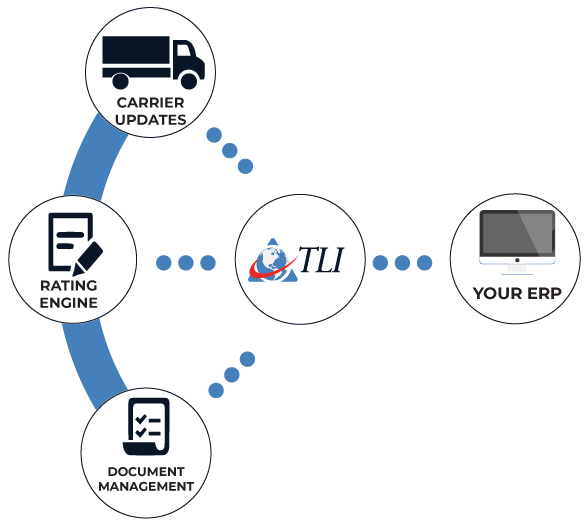
Benefits of ERP Integration with a TMS System
- Streamlined Communication and Data Integration: Integrating ERP with a TMS establishes a seamless flow of information between different departments and systems involved in the supply chain. By connecting procurement, order management, inventory, finance, and transportation functions, shippers & raw material vendors can eliminate manual data entry and enjoy real-time visibility across their operations. This integration ensures & enhances accurate and timely information sharing, minimizing errors and delays.
- Enhanced Operational Efficiency: By integrating with the TMS, shippers can optimize their transportation processes, leading to improved operational efficiency. The TMS can leverage the ERP data to automate critical tasks, such as load planning, carrier selection, and route optimization. This automation eliminates time-consuming manual processes, reduces human errors, and allows shippers to allocate their resources more effectively.
- Cost Savings and Improved Financial Control: Integrating ERP with a TMS enables shippers to gain better control over their transportation costs. With real-time visibility into transportation-related expenses, such as freight rates, fuel costs, and carrier performance, shippers can make data-driven decisions to optimize their shipping strategies. By leveraging this information, they can negotiate better rates with carriers, consolidate shipments, and identify cost-saving opportunities. Ultimately, this integration helps shippers reduce transportation expenses and enhance overall financial control.
- Enhanced Customer Satisfaction: Efficient transportation management is a critical aspect of delivering exceptional customer service. The integration of ERP and TMS empowers shippers to meet customer expectations by providing accurate and real-time information on order status, shipment tracking, and delivery schedules. This visibility enables proactive issue resolution, allowing shippers to address any potential delays or problems before they impact customer satisfaction. By consistently meeting delivery commitments and enhancing communication, shippers can build stronger customer relationships and gain a competitive edge.
- Scalability and Flexibility: ERP integration with a TMS offers shippers the ability to scale their operations and adapt to changing business needs. As the company grows or expands into new markets, the integrated system can handle increased volumes and complexities efficiently. The flexibility of this integration allows shippers to adjust transportation strategies, manage new carrier relationships, and handle diverse transportation modes seamlessly. By ensuring scalability and adaptability, shippers can effectively navigate the evolving logistics landscape.
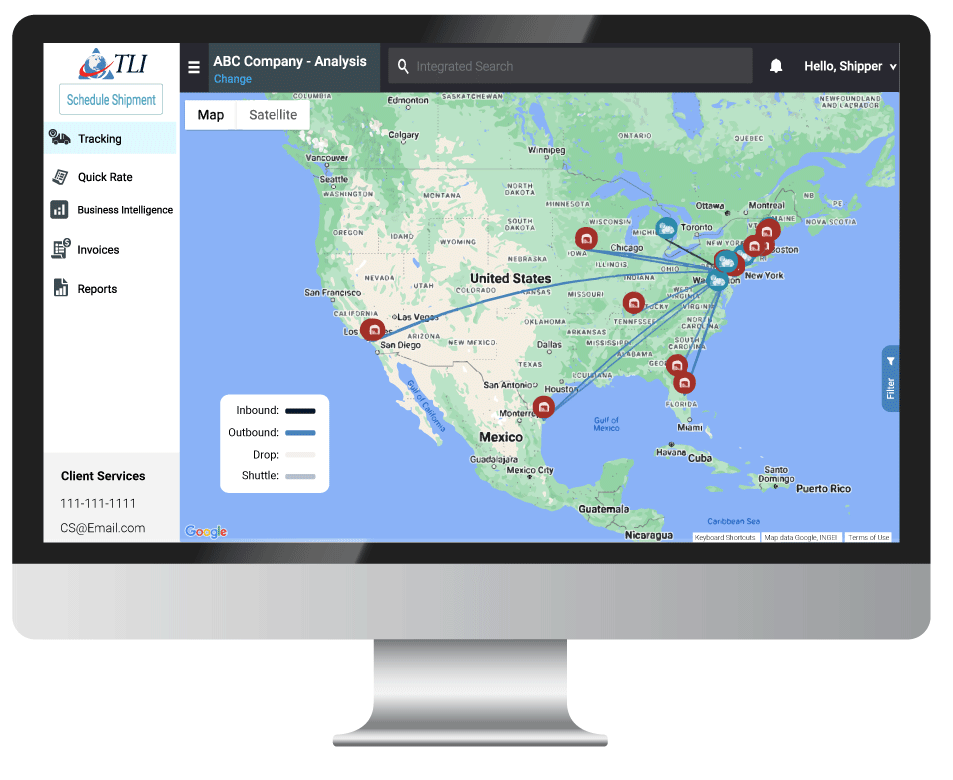
The integration of ERP with a Transportation Management System presents shippers with numerous benefits, enabling them to streamline operation processes, reduce supply chain costs, track inbound raw materials, and achieve long-term growth. By leveraging the power of this technology integration, shippers can stay ahead of the competition, drive efficiency across their supply chains, and position themselves for success in today's demanding logistics industry.
Embracing technology-driven solutions has become imperative for shippers to unlock their full potential and thrive in the dynamic world of modern logistics.
ERP TMS
TLI Insights
Get the latest logistics insights and tips from TLI's award-winning team. Stay ahead in transportation planning.
Questions? Email us at marketing@shiptli.com

